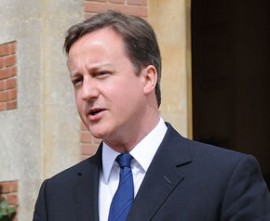
The fallout from last night’s European Council summit in Brussels is still falling out, but I think it is possible now to identify the main lines of what was and was not achieved. The news reports portray the outcome as Britain versus the rest of the EU, and I am not sure they are wrong.
What the other member states have achieved is the outline of an agreement as to how the eurozone will be governed in future. (A summary on EUobserver here.) This blog has remarked repeatedly that the crisis in the eurozone is political and not economic, so an agreement of this sort is a necessary part of the solution. Whether this particular agreement is itself good enough is something that needs further thought and information before a conclusion can be reached.
What they have not achieved is the right to implement this agreement by amending the Lisbon treaty. David Cameron refused to allow that. A man who was one of Lisbon’s last critics is now recast as one of its last defenders. Those countries that wanted a new treaty have been forced instead to start from scratch, outside the existing EU institutions. This might well weaken the standard of democracy and accountability that the EU has achieved up until now, which is a reason for not being too delighted about what has been agreed. It will also weaken the influence of the UK over the new treaty: it is part of the existing institutions but will not be part of any new ones.
So why did David Cameron say no? His ostensible reason was to protect the British financial services industry. (Read a summary of what the UK government wanted here.) He asked for changes to the way in which the single market deals with certain financial services matters, and when he did not get them, he vetoed the new treaty. Now, opinions will differ over how dramatic those changes he requested would have been – the French clearly thought they were more significant than the British did – but what is beyond doubt is that vetoing the new treaty has not brought those changes into being. If the British government wanted unanimous decision-making on, for example, the “maximum harmonisation provisions that prevent member states imposing additional requirements”, it has not got them.
These are odd demands to make given that Britain is not in practice outvoted on these matters under QMV anyway, so a switch to unanimity would make little difference to regulation in the end. Even odder, vetoing something important to the other member states now – a treaty to safeguard the euro – makes it less likely that they will be sympathetic to Britain in future. Unanimity was needed to prevent the others from ganging up on Britain; the others are only minded to gang up on Britain because of the demand for unanimity.
This cannot be the only reason and, in fact, I am sure it is not. David Cameron’s main motivation was to show his backbenchers that he is a eurosceptic and to stop them from trying to overthrow him. A new treaty brought home from Brussels for ratification in the House of Commons would have been in grave danger of defeat. This would have been true even if, as he would have insisted if such a treaty had gone ahead, the new treaty did not change the legal position of the UK within the EU. It might well have been true even if the treaty had improved that position, for example by adopting his demands on financial services legislation.
The state of British politics now is such a stranger to rational debate and facts about the EU that almost anything could happen. If there is a reason for pro-Europeans in Britain to take any satisfaction from what has just happened, it is that the wilder possibilities of Britain leaving the EU have been avoided. (And failure to ratify a new treaty might have killed the euro, too.) Instead, rather than a risk of total destruction to Britain’s EU membership, we have to settle merely for the certainty of some more damage. Maybe that’s preferable: again, it will take some time and some more information to be able to decide.
In the short-term, though, what we can be sure of is that Britain’s position in the EU is weakened but David Cameron’s position in the Tory party is strengthened. That’s what he has achieved.
